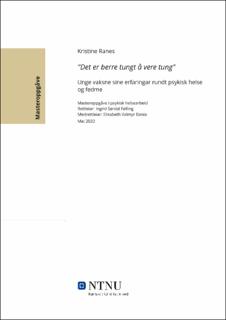| dc.contributor.advisor | Følling, Ingrid Sørdal | |
| dc.contributor.advisor | Bania, Elisabeth Valmyr | |
| dc.contributor.author | Ranes, Kristine | |
| dc.date.accessioned | 2022-07-05T17:23:22Z | |
| dc.date.available | 2022-07-05T17:23:22Z | |
| dc.date.issued | 2022 | |
| dc.identifier | no.ntnu:inspera:110824837:65498723 | |
| dc.identifier.uri | https://hdl.handle.net/11250/3002966 | |
| dc.description.abstract | SAMANDRAG
Bakgrunn: Psykiske lidingar og fedme er blant dei største folkehelseutfordringane vi står overfor i dag. Spesielt unge vaksne opplever psykiske lidingar og fedme. Det er behov for meir kunnskap og innsikt i desse komplekse helsetilstandane som påverkar unge vaksne sine liv på mange måtar, og for å tilby hensiktsmessige helsetenester og støtte.
Hensikt og problemstilling: Målet med studien er å få meir innsikt og kunnskap om korleis unge vaksne opplever komplekse helsetilstandar som psykisk helse og fedme. Problemstillinga til denne studien er: «Kva for erfaringar har unge vaksne med fedme relatert til psykisk helse og sin fedmesjukdom?»
Metode: Dette er ein kvalitativ studie som baserar seg på fem individuelle semi-strukturerte dybdeintervju. Unge vaksne i alderen 19-32 år deltok i studien. Datamaterialet vart analysert gjennom systematisk tekstkondensering. Studien baserar seg på ei fenomenologisk hermeneutisk tilnærming der informanten sine subjektive erfaringar er i fokus.
Resultat: Dei fem hovudtemaene er følgande:
1) Tankar kring eigen kropp: Informantane beskriv korleis fedme kan forårsake både fysiske og psykiske helseutfordringar, og korleis dei opplever press i samband med kropp og utsjånad. Dei viser til arv og miljø i forbindelse med fedme, og korleis dei opplever vektrelaterte helsetiltak.
2) Psykisk helsetilstand: Informantane reflekterer over arv og miljø knytt til psykisk helse. Vidare beskriv dei korleis ulike faktorar kan ha effekt på deira psykiske helse, som stress, sjølvbilde og sjølvtillit, og kva for tankar dei har kring psykiske helseproblem i samband med fedme.
3) Sosialt og deltaking: Informantane fortel kva dei liker å gjere i fritida si, og vidare beskriv dei opplevinga av sosiale hindringar, stigma og fordommar i samfunnet som følge av fedmen.
4) Mobbing og belastningar i barndommen: Refleksjonar kring barndomsopplevingar som mobbing og sosial ekskludering, og tankar kring familiemiljøet i samband med fedme og psykiske helseutfordringar i dag.
5) Søvn og matvanar: Informantane beskriv deira matvanar og utfordringar knytt til søvn og døgnrytme, og korleis dette påverkar fedmen og den psykiske helsa.
Oppsummering: Informantane i studien beskriv at psykisk helse og fedme påverkar kvarandre i stor grad. Dei unge vaksne formidlar ein kompleksitet i deira tilværelse med biologiske, psykologiske og sosiale utfordringar, noko som viser nødvendigheita av ei heilskapleg tilnærming frå helsevesenet. | |
| dc.description.abstract | ABSTRACT
Background: Mental health problems and obesity are some of the greatest public health challenges in today’s society. Particularly young adults are experiencing mental health problems and obesity. There is a need for more knowledge and insight within these complex health conditions which affect young people’s lives in many ways, and to be able to offer appropriate health services and support.
Aim and research question: The aim of this study is to generate more knowledge about young adults and their experiences of complex health conditions concerning mental health and obesity. The research question for this study is: “What kind of experiences do young adults with obesity have related to mental health and their obesity disease?”
Method: This is a qualitative study based on five individual semi-structured research interviews. Young adults aged 19-32 years participated in the study. The data material was analyzed by using a systematic text condensation. The study is based on a phenomenological hermeneutic approach, where the subjective experiences of the participants are in focus.
Results: The five main themes were as follows:
1) Thoughts about one’s body: The participants describe how obesity can cause physical and mental health problems, and how they experience pressure about their bodies and looks. They referred to heritage and environment in connection with obesity, and experiences with measures regarding weight.
2) Mental health condition: The participants reflect about heritage and environment in relation to their mental health status. Furthermore, they explain what affects their mental health status, such as stress, self-image and self-esteem, and the thoughts they have about mental health problems in relation to obesity.
3) Social life and participation: Describing what they prefer to do in their spare time, and how they experience social barriers, stigmatization, and prejudice because of obesity in the society.
4) Bullying and burdens in childhood: Reflections about childhood experiences such as bullying and social exclusion, and thoughts about family environment in relation to obesity and mental health problems today.
5) Sleep and eating habits: The participants describe their eating habits and challenges in relation to sleep and circadian rhythm, and how it affects obesity and mental health.
Summary: The participants in this study describe that mental health and obesity affect each other to a great extent. Young adults convey complexity in their struggles such as biological, phycological and social challenges, which indicates the need of a holistic approach from the health care system. | |
| dc.language | nno | |
| dc.publisher | NTNU | |
| dc.title | Det er berre tungt å vere tung | |
| dc.type | Master thesis | |
